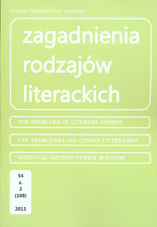Kierkegaard i krytyczna teoria tragedii
Kierkegaard and the Critical Theory of Tragedy
Author(s): Michał MrugalskiSubject(s): Literary Texts
Published by: Łódzkie Towarzystwo Naukowe
Summary/Abstract: The paper surveys the influence of Kierkegaard's theory of the Greek and the modern tragedy, spread through his various writings, on the 20th Century Critical Theory, especially Adorno. The theses that author formulates may be summarized as follows: there is a critical strain in the tragedy theory (i.e. an anti−metaphysical und ant−mythical strain) and Kierkegaard is one of its major proponents. Moreover, the way it embraces the Greek tragedy is a reliable sign for the theory's being critical. The author names five respects in which Kierkegaard influenced first Lukács, Rosenzweig, than Bloch and Benjamin and finally Adorno. These are: a very specific, based on a notion of sentiment, way of confronting the ancient and the modern tragedy; overlapping of the tragedy and the religious salvation; a philosophy of a special tragic “moment" that is responsible for the poetics of modern critical writing; special reading of tragedy as a forerunner of the dialectic of the Enlightenment; Kierkegaard's reading of the Greek tragedy and comedy as a key to Kafka's writings and especially their interpretation by the critical thinkers.
Journal: Zagadnienia Rodzajów Literackich
- Issue Year: 54/2011
- Issue No: 2
- Page Range: 373-388
- Page Count: 16
- Language: Polish

